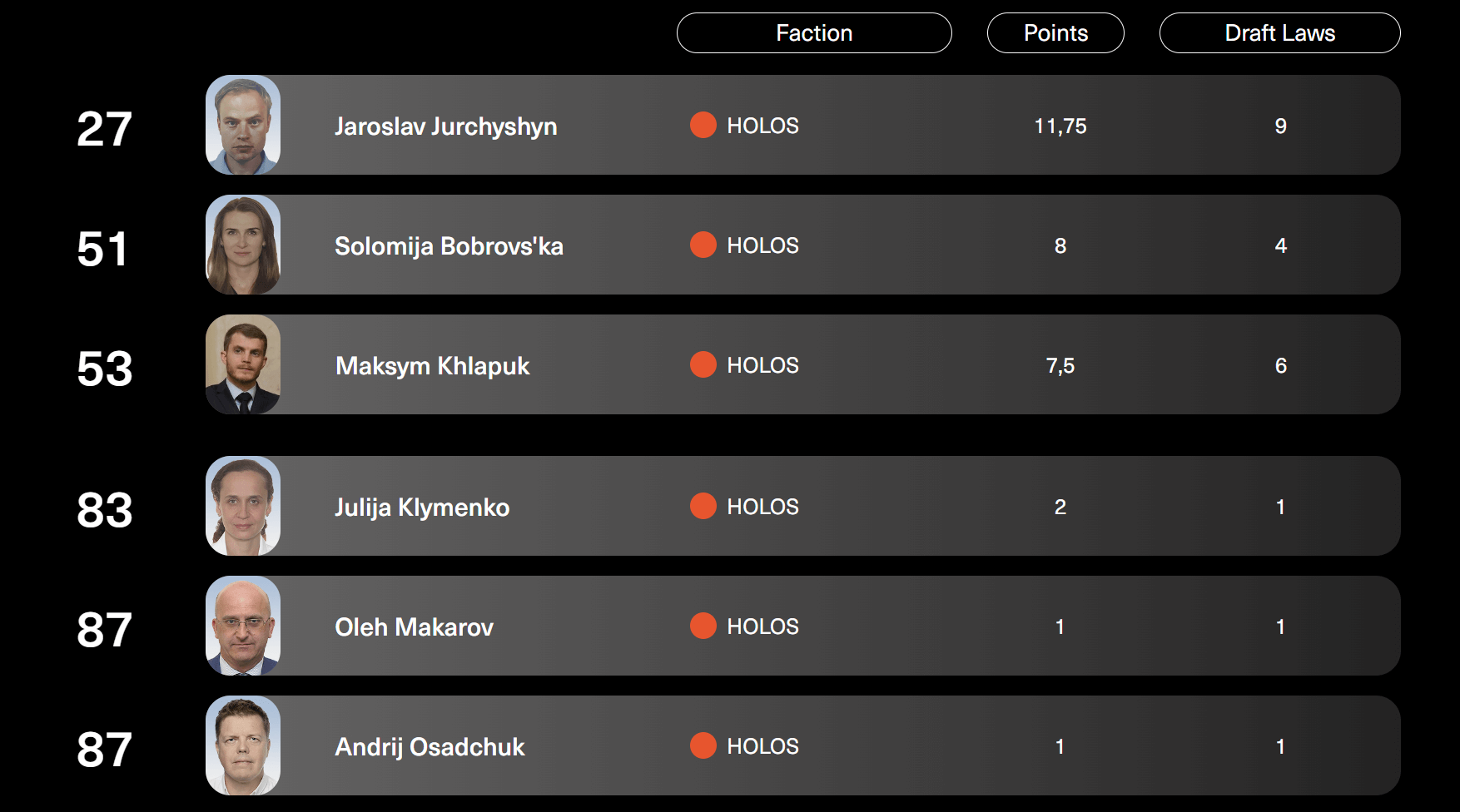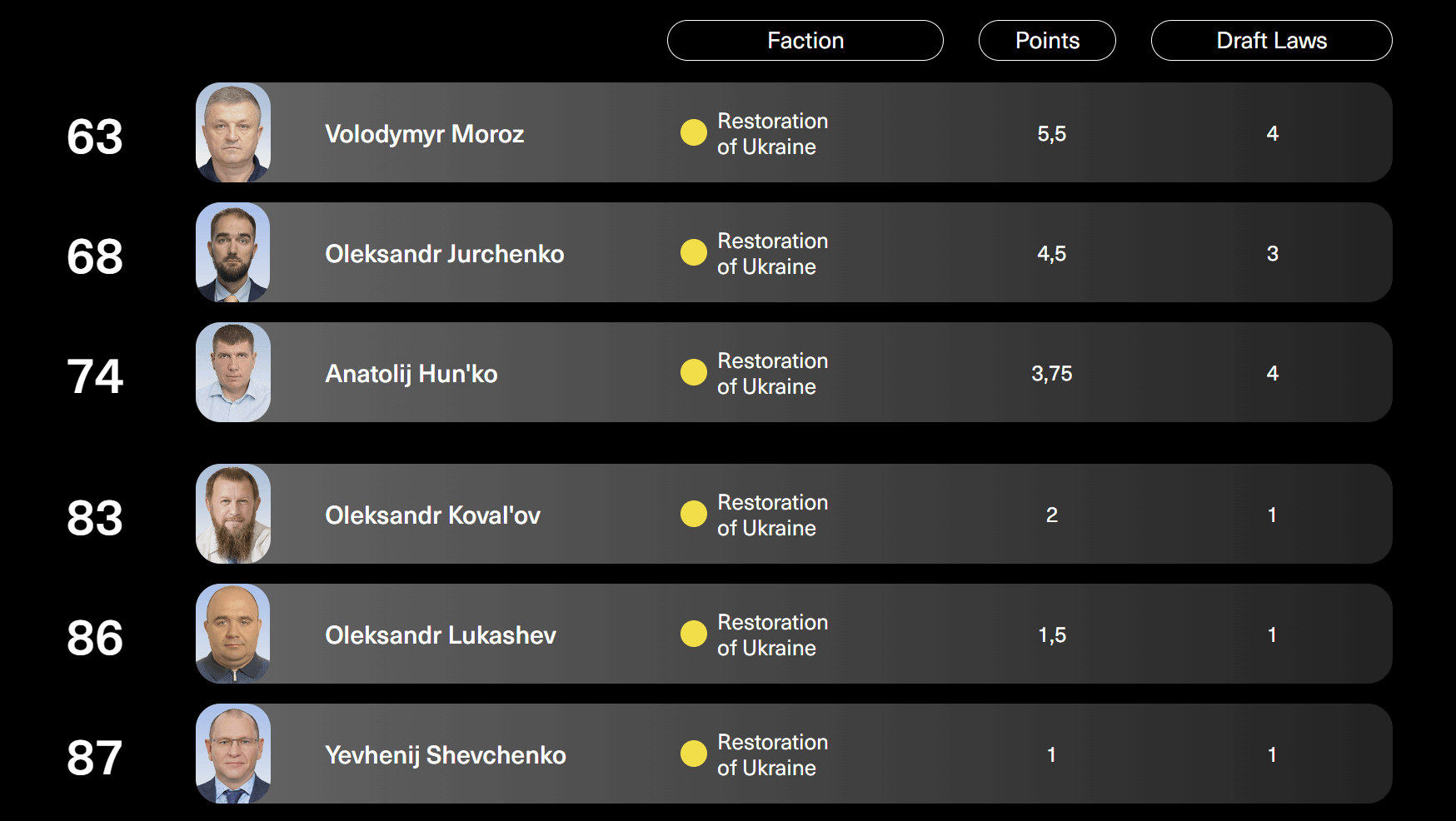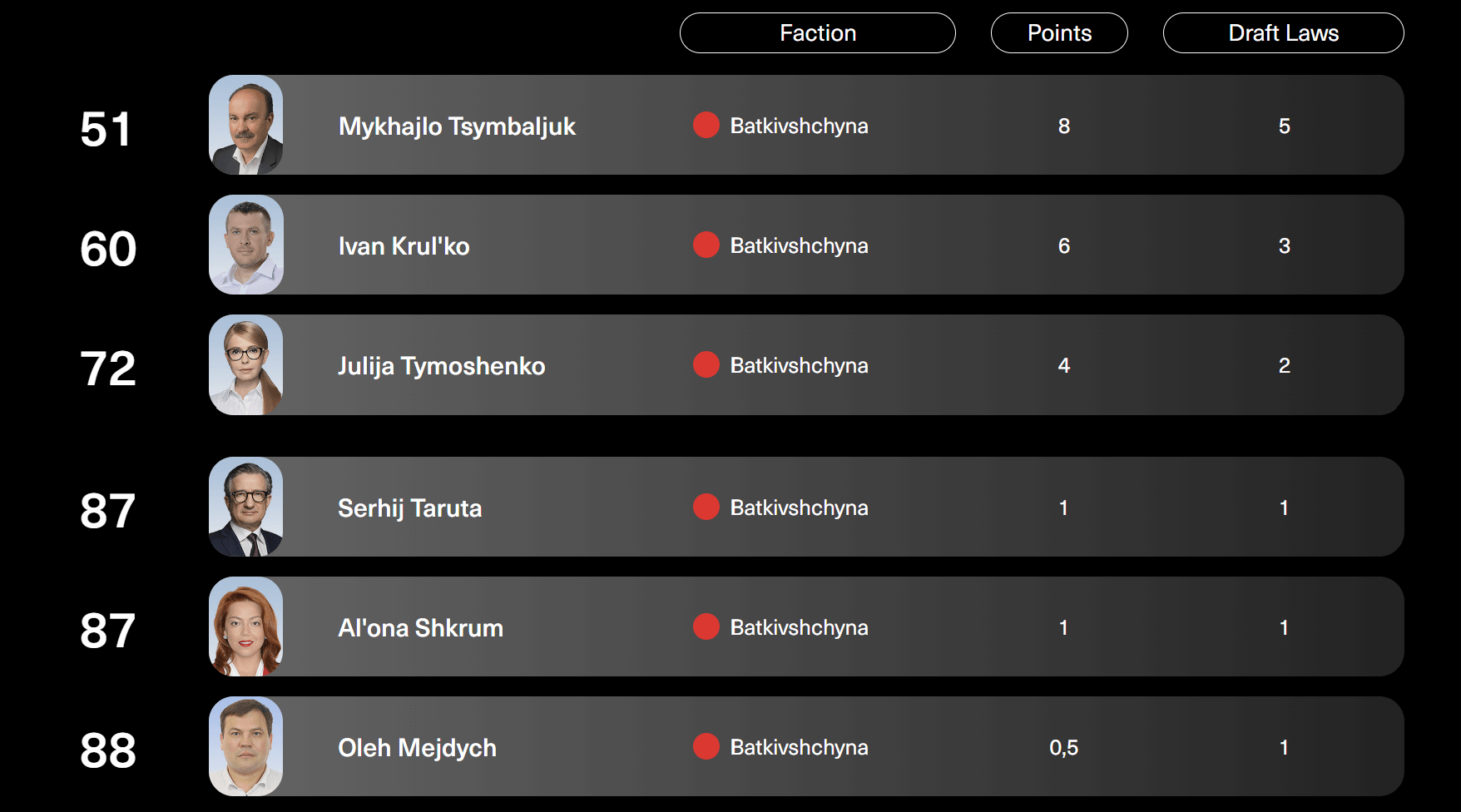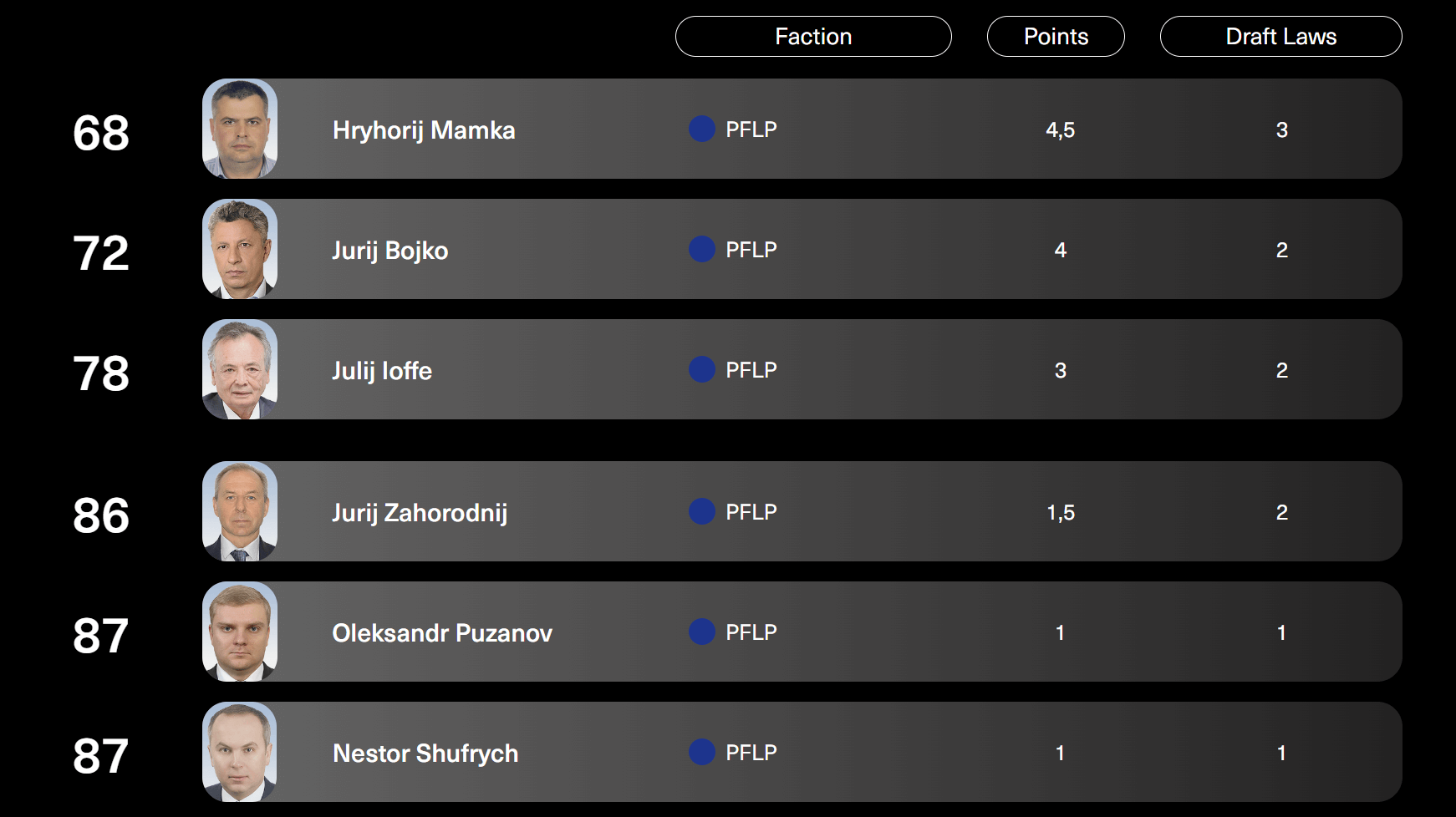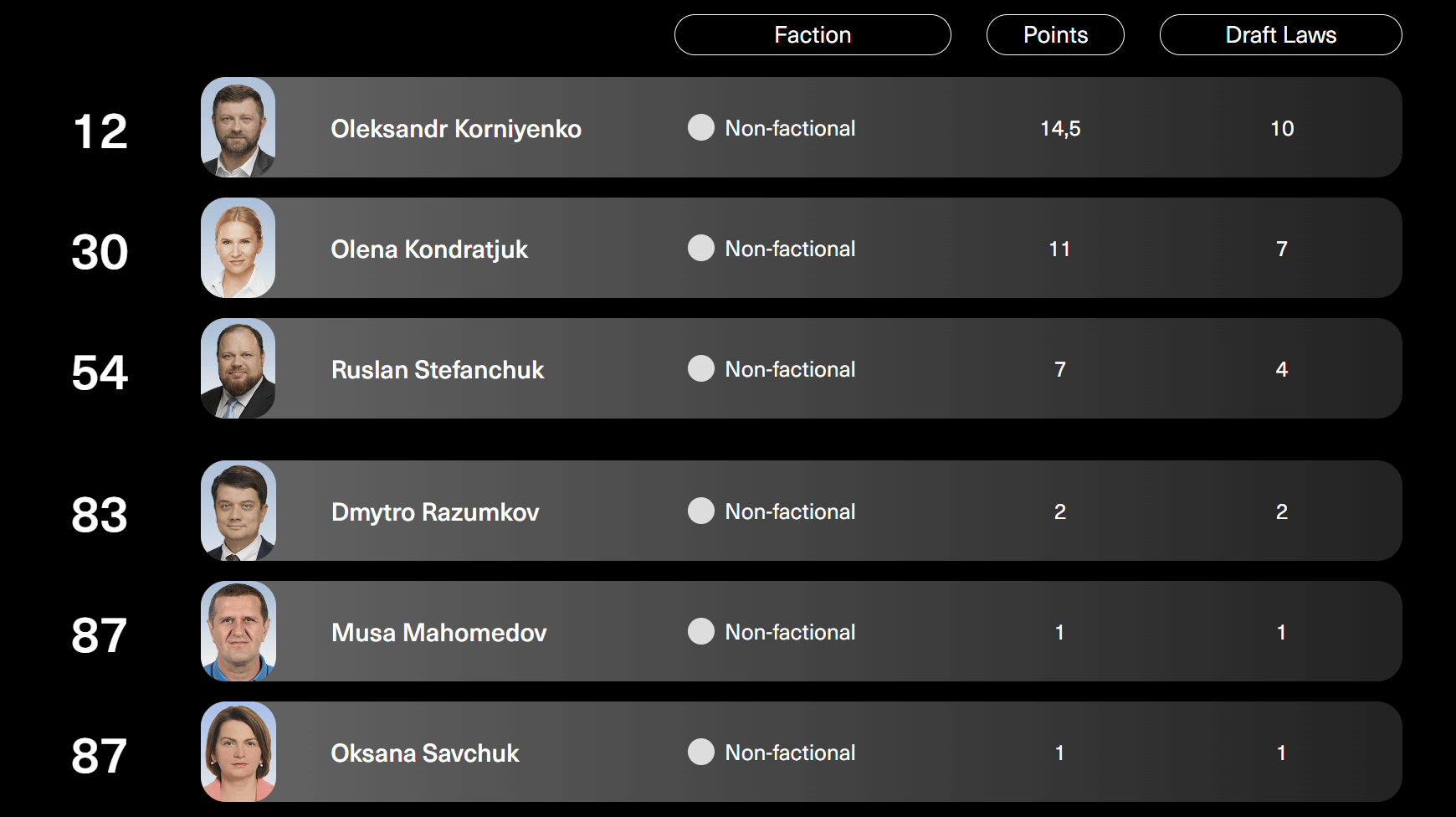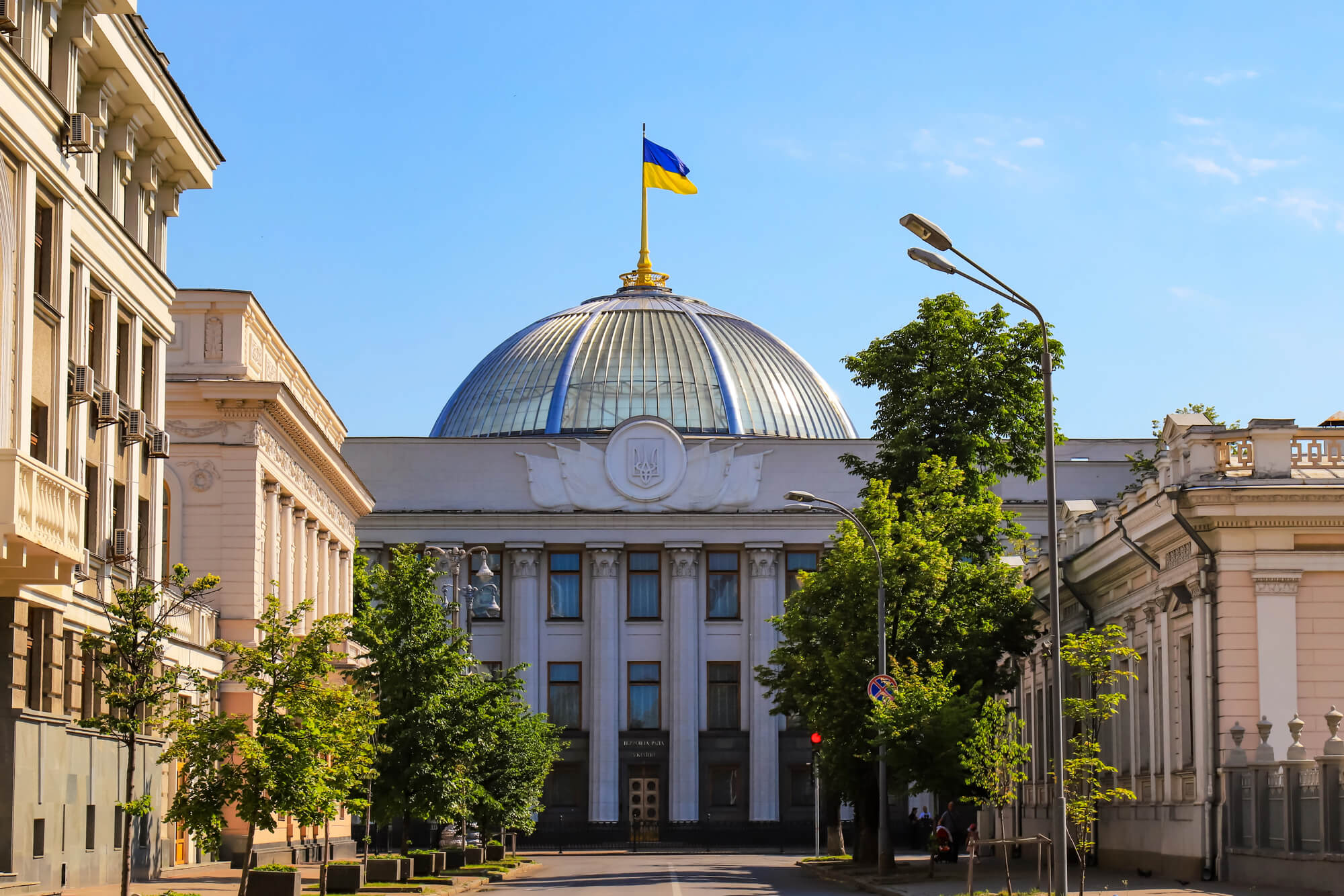Ukraine is in the process of active reconstruction, restoring not only infrastructure objects but also changing the “rules of the game” within the country. European integration alone requires the implementation of over 28,000 legislative changes. We have tracked who among the people’s deputies most often initiates reforms. To do this, we selected only those draft laws that significantly affect social life and the economy, and the Reform Index experts evaluated them on a scale from -5 to +5, where -5 indicates significant anti-reform efforts and +5 indicates significant reform.
Each MP received a place in the rankings based on the sum of points from the weighty draft laws they initiated. In which factions do reformist deputies constitute the largest percentage? Does age and gender influence initiative? Which areas did the reforms touch upon? Answers to these and other questions can be found in our research.
Key findings
- None of the laws that received high ratings from the Reform Index experts in 2023 were authored without representatives of the Servant of the People party.
- Out of 50 reforms, “Servants of the People” were the sole authors in only 18% of cases. 82% of reforms were initiated by representatives of various factions.
- None of the draft laws received a negative rating from experts, yet none received more than +2 points, a score that distinguishes very influential reforms from merely influential ones. However, the main point is that progress was made.
- Six out of the 20 most active reformers are women. 89% of female and 74% of male MPs initiated reforms.
- In 2023, the Cabinet of Ministers initiated 30 reform bills, three times more than in 2022 and more than those initiated by individual deputies or the President. The President initiated four reform laws, his lowest figure since 2019.
- Age is not a determining factor for initiating reforms. Representatives of middle age proved to be the most active legislators, as they make up the majority in the Verkhovna Rada. However, active reform initiators are found among both young (33 years old) and older (61 years old) MPs.
- Priority areas for reform in 2023 included business regulation, energy independence, judicial system reform, anti-corruption efforts, and social protection. Reforms focused on adapting to European standards, de-monopolizing the economy, and laying the groundwork for post-victory recovery.
Who initiated the most reform bills?
In Ukraine, changes can be initiated by the Verkhovna Rada, the Cabinet of Ministers, the President, and other governmental bodies (with only the first three being able to submit draft laws), so we decided to examine who among them contributed the most to creating changes in 2023.
Overall, the Reform Index experts evaluated 168 regulatory documents over the past year, which can be considered reformist, meaning they significantly alter the “rules of the game“ в in Ukraine. Among them are 84 laws, 66 resolutions, one Cabinet of Ministers order, 11 National Bank resolutions, four orders from various institutions, one decision from the National Securities and Stock Market Commission regarding terminating private pension funds, and the eRecovery program project.
The most active reformer turned out to be the Cabinet of Ministers, which initiated 97 reform regulatory acts (including 30 laws) overall. Meanwhile, parliamentarians registered 50 draft laws implementing reforms (see Figure 1).
Figure 1. Reformative documents by type and subject of legislation, number
Recently, Parliament passed a bill on the hierarchy of regulatory acts in Ukraine, clearly defining the place of each document relative to others. Naturally, the Constitution of Ukraine holds the highest position, followed by international agreements and laws. Next come other regulatory acts, such as resolutions and orders. Together, these documents regulate the social order in Ukraine, introducing beneficial and modern interaction methods or preserving outdated ones.
Typically, the most significant changes in the country are implemented through laws. Therefore, we will now calculate the rankings of initiators solely based on reform draft laws adopted by Parliament. Each initiator receives as many points as the law received from Reform Index experts.
Sometimes, the actual authors of legislative initiatives remain in the shadows. For instance, when Ministries or the National Bank of Ukraine submit draft laws developed by them to Parliament through MPs or the President. Identifying the exact initiators of legislative initiatives is usually not easy. Therefore, in this article, we rely on data about the official initiators indicated in the draft law profile.
Methodology
For analysis, we selected laws included in the Reform Index. Throughout the year, we selected laws that significantly impact social life and the economy, and the Reform Index experts evaluated these reforms on a scale from -5 to +5, where -5 indicates substantial anti-reform efforts and +5 indicates significant reform. A score of more than +2 is considered an acceptable pace of reform. More details about the methodology of calculating the Reform Index can be found here.
Over the past year, none of the draft laws became anti-reform, and all received positive expert ratings. On average, the laws scored +1.2 points, with a maximum score of +2 attained by 13 bills. Throughout 2023, no enacted law surpassed the +2 mark.
In the rankings, we did not consider MPs who, due to objective reasons, did not have the opportunity to regularly attend Parliament, such as Roman Lozynskyi and Roman Kostenko (Holos), Mykhailo Zabrodskyi (European Solidarity), Serhii Rudyk (For the Future), Sviatoslav Yurash (Servant of the People), who joined the Armed Forces of Ukraine, and Yana Zinkevych (European Solidarity), who serves as the commander of a volunteer battalion called Hospitallers.
Out of the 84 reform laws, the Cabinet of Ministers initiated 30. For this, it earned 33.75 points, thus achieving its peak productivity in the last three years. In 2022, the Cabinet of Ministers initiated 27 reform draft laws with a cumulative score of 31.4 points. In 2021, the Cabinet of Ministers was less productive, registering only ten reforms with 10.5 points. Danylo Hetmantsev topped the rankings at the time, significantly outpacing other legislators (25.6 points). However, comparing individual deputies to the entire Cabinet of Ministers is inappropriate.
President Volodymyr Zelensky's contribution to reform laws significantly decreased: over the year, only four out of the draft laws initiated by the President made it into the Reform Index. These include the Law on the Criminalization of Smuggling, signed at the end of 2023, as well as three laws on accession and ratification of international agreements (the Minamata Convention on Mercury, the Marrakesh Treaty facilitating access to published works for the visually impaired, and participation in the EU Civil Protection Mechanism). In 2022, President Zelensky initiated 11 reforms.
July and August of last year were fruitful for reform laws (see Figure 2), particularly regarding Eurointegration. During these months, 13 and 15 draft laws were signed, respectively. A third of them were initiated by the Cabinet of Ministers. In October-November, the pace of adopting reform initiatives decreased. In December, closer to the end of the tenth plenary session of the Verkhovna Rada, 13 important initiatives were signed, four of which were also related to Eurointegration.
Figure 2. Distribution of adoption of reform laws throughout the year
MPs' work
Over the past year, 315 deputies out of 401 active ones showed reform initiative, either individually or in groups. Approximately one-fifth (57 MPs) did so only once.
The record holder for the number of initiatives is Oleksandr Horobets from the Servant of the People party. With his participation, 23 of the 50 deputy reform draft laws were registered.
According to the analysis of all draft laws registered during the IX convocation of the Verkhovna Rada, deputies mostly initiate regulations individually or in groups of up to ten people. Sometimes, groups of initiators comprise up to twenty MPs, but those with more than twenty MPs are less common. However, a different pattern is noticeable in the case of reform draft laws (see Figure 3).
Figure 3. Bills included in the Reform Index, by the number of initiators
Only one reform was initiated individually, namely Bill No. 3265, according to which parents will not be able to alienate not only housing but also any real estate owned by their children and wards without the permission of the guardianship authorities. This bill was registered by Ihor Fris, a member of the Servant of the People party. Four months after registration, the Parliament adopted the law.
Two draft laws have more than 120 initiators:
- Law No. 3161, which regulates allowances for service members and the provision of leave during martial law, was developed with the support of 126 MPs from all factions and non-factional members.
- Law No. 5707, which lays the groundwork for the legislative process "from start to finish" and regulates the hierarchy of regulatory acts, was initiated by 191 MPs representing all factions except European Solidarity and Restoration of Ukraine.
Most reforms (15 documents or 30% of the total) were initiated by groups of 10-19 MPs.
Leaders in the rankings
The top 20 positions by the total score received for initiating reforms are occupied by 22 MPs (21 from the Servant of the People party and non-factional member Oleksandr Korniienko). They scored between 28.6 and 13 points. Overall, the majority of the top positions are held by non-public figures.
View the full rankings of deputies in the infographic at the link.
For the third consecutive year, faction leaders are positioned in the middle of the list of reform initiators. However, there are exceptions: David Arakhamia, the head of the Servant of the People faction, rose 84 positions compared to 2022 and ranked 25th, scoring 12 points. Yuliia Tymoshenko, the head of the Batkivshchyna faction, dropped from 109th to 72nd place, while the co-chair of the European Solidarity faction, Iryna Herashchenko, rose from 105th to 40th place.
MP Maryana Bezuhla, who often found herself in the media spotlight in 2023, received 15.5 points for twelve draft laws, securing her 10th place in the rankings. She was 32nd in the previous year. Bohdan Kytсak and Ivan Kalaour, representatives of the Servant of the People party who lagged behind last year, rose by over 50 points in the rankings. Non-factional member Oleksandr Korniienko, who was also in the Servant of the People party the previous year, increased his ranking by 69 positions.
Table 1. Dynamics of reform initiation by deputies for 2021-2023: share of initiated bills by the deputy out of all reform bills, %
Reform initiators by factions
Members of the Servant of the People faction proved to be the most active: 217 out of 235 (92%) members contributed to creating reform laws signed by the President in 2023 (Figure 4). Representatives of the Holos and For the Future factions also actively submitted reform bills. Only about half of the members of other factions participated in initiating draft laws.
Figure 4. Percentage of MPs who were co-authors of reform bills, % of all faction members
The highest average score of 6.5 per MP is expectedly held by the Servant of the People faction (Figure 5); deputies from Dovira and non-faction representatives come close, averaging 6 and 5.9 points, respectively.
We observe a certain "party solidarity": the more deputies of the faction initiate reforms, the more each deputy contributes to initiating laws, and the higher the score they receive. Non-faction members stand out from this logic: they have one of the highest average scores per initiating deputy, but the share of reform MPs is only 35%. This pattern is easily explained as they do not form factions, so non-faction lawmakers are only accountable for themselves. They either make efforts to bring about changes on a regular basis, or they are not listed as reformers at all. Overall, MPs tend to align with their colleagues within their faction.
Figure 5. Dependence of the average score per active MP on the share of initiative-taking deputies in the faction
Note: The size of the triangle reflects the number of deputies of a particular Verkhovna Rada of Ukraine faction.
Next, let us consider the initiators of reform laws by factions.
All the laws that received high ratings from the Reform Index experts in 2023 have representatives from the Servant of the People faction among the co-authors. Logically, deputies of the ruling majority occupy the top positions since they have a greater chance of passing bills and, therefore, more incentives to initiate reforms than other factions. This may also indicate that opposition parties find it much harder to gather votes to support their bills.
Therefore, bills from other factions have fewer chances of becoming laws and making it onto our list, so there is no point in comparing factions with each other. It's more interesting to see who within the factions is making efforts for change and who is just "sitting idly by."
Most of the MPs topping the factional rankings are over 50 years old: Serhiy Minko (Dovira), Mykhailo Tsymbaliuk (Batkivshchyna), Volodymyr Moroz (Restoration of Ukraine), Iryna Konstantkevych (For the Future), and Iryna Herashchenko (European Solidarity). Slightly younger representatives from Servant of the People and Platform For Life and Peace (PFLP) are Oleksandr Horobets and Hryhoriy Mamka. The youngest leader is Yaroslav Yurchyshyn from Holos, who is 43 years old. Recently, he was appointed as the head of the Verkhovna Rada Committee on Freedom of Speech instead of Nestor Shufrych, who is currently in custody on suspicion of state treason.
Servant of the People: 92% of initiative-taking MPs
The faction contributed to initiating all important bills registered by MPs (50 out of 50). At the same time, the most popular topics are energy independence (6 laws), business regulation (5 laws), and social protection (4 laws).
The following MPs hold three first and three last places:
Holos: 80% of initiative-taking MPs
On average, each deputy initiated 2.8 significant regulations, the second-highest figure after the Servant of the People faction.
Members of the Holos faction participated in submitting 22 out of 50 "deputies' laws" included in the Reform Index, focusing primarily on social protection (laws simplifying the rules for importing humanitarian aid, increasing payments and leave for military members, benefits for released captives and their children, and a law on preserving financial support for captives and MIAs). Additionally, the Holos representatives initiated three bills each on energy independence and healthcare.
At the beginning and the end of the rankings are:
For Future: 76% initiative-taking MPs
The average faction member scored 4.1 points and initiated 2.4 draft laws.
In total, faction members participated in developing 23 reforms, covering energy independence, business regulation, social issues, culture, decentralization, trade, and others.
The For the Future deputies are ranked as follows:
Dovira: 58% initiative-taking MPS
Dovira took part in initiating 22 laws, focusing on social protection and economic independence, with four draft laws for each theme. Members of this faction submitted all draft laws jointly with representatives of Holos, except for the law on preventing abuse in wholesale energy markets. One deputy from Dovira, Andrii Kit, and thirty Servant of the People representatives joined in developing this initiative.
The faction's leaders and outsiders are:
European Solidarity: 56% of initiative-taking MPs
In total, the members of European Solidarity participated in developing 13 draft laws, surpassing only the representatives of PFLP. Four of them are related to social protection.
The following deputies occupied the first and last three places:
Restoration of Ukraine: 53% of initiative-taking MPs
The faction's average score (2.8) remains second from the bottom after PFLP. On average, the deputies of this faction initiated one law each, registering a total of 14 draft laws. The MPs' focus was on laws concerning energy independence.
Leading and closing the faction's rankings are:
Batkivshchyna: 50% of initiative-taking MPs
Like European Solidarity, Batkivshchyna contributed to the development of 13 reform laws, focusing on social security.
The deputies who garnered the most and the least points are:
Platform for Life and Peace: 36% of initiative-taking MPs
The MPs from PFLF participated in developing eight draft laws that entered the Reform Index. On average, each deputy scored 2.4 points.
Leading and closing the faction's rankings are:
Non-factional: 35% of initiative-taking MPs
Independent MPs participated in initiating 16 groundbreaking draft laws.
The top three leaders and anti-leaders are:
Do the age and gender of the MPs influence their reform activity?
To better understand the impact of gender diversity on the factions' legislative activity, we visualized data on the proportion of women, the average score of reform initiatives, and the average number of bills initiated per MP for each faction (see Figure 6).
Figure 6. Relationship between the average score and the number of initiatives based on the proportion of women in the factions
There is a noticeable positive correlation between these indicators. Factions with a higher proportion of women, such as Holos (45% women), European Solidarity (33%), and non-factional deputies (25%), demonstrate higher average scores for their reform initiatives—4.5, 4.5, and 5.9 respectively. Conversely, factions with very low female representation, such as Platform for Life and Peace (0% women) and Batkivshchyna (12.5%), have some of the lowest average scores, namely 2.4 and 2.8.
Exceptions are the Servant of the People and Dovira factions. Despite a relatively low proportion of women (23%), the former demonstrates the highest average score of 6.5, likely due to their parliamentary majority and easier advancement of reforms. Representatives of Dovira have established themselves as key allies of Zelensky, often coming to the rescue of the parliamentary majority during critical voting moments. It is not surprising that they are also actively involved in initiating reforms.
Therefore, a more balanced gender composition within factions can positively influence their ability to initiate and advance legislative reforms. This may be associated with the fact that factions with a higher proportion of women are generally more progressive.
Figure 7. Distribution of bill initiators by age and by faction
In the IX convocation of the Verkhovna Rada of Ukraine, 12% of deputies are under 35, with the rest being older. Exactly two-thirds of both age groups made it onto the list of reformers.
In the sample of the top 20 reformers, the age distribution corresponds to the overall Parliament: three out of twenty-two deputies are younger than 35 (13%), indicating that the propensity for initiating reforms is not age-dependent.
The largest share of reformer deputies falls within the average age range of 40-47 years, constituting the largest age group in the Verkhovna Rada overall.
Cooperation among factions in initiating reforms
As noted earlier, representatives of the Servant of the People party were co-authors of all reform legislative initiatives and initiated nine laws independently. The majority of laws in 2023 were initiated by representatives of multiple parties (see Figure 8).
Figure 8. Frequency of laws initiated jointly by multiple factions. The width of the lines and markers indicate how many laws were initiated jointly by representatives of each faction. Gray lines indicate five or fewer joint bills.
The Servant of the People and For the Future factions jointly initiated the highest number of laws (23). Outside the majority, the Dovira and Holos factions were most frequently co-authors of bills (15). Dovira has been a key ally of Zelensky's team for years, ensuring the necessary number of votes in Parliament to adopt important laws, and so they also draft bills together.
The least proactive factions (Opposition Platform for Life and Peace and Restoration of Ukraine) also collaborate the least with other factions. Interestingly, OPFL initiated seven out of its eight bills together with Dovira and only four together with representatives of Restoration of Ukraine, although both OPFL and Restoration were formed based on the pro-Russian OPFL. Batkivshcyna collaborates the least with pro-Russian parties, having four joint bills with PFLP and three with the Restoration of Ukraine. European Solidarity also has limited cooperation with them, sharing only five bills with each faction.
Which areas are in focus?
Figure 9. Number of reforms by sector
In 2023, the majority of reform-oriented legislative initiatives focused on business regulation: deregulation, simplification of business conditions, and adaptation of Ukrainian legislation to EU norms. Laws were enacted to simplify activities for small wine producers and legalize craft alcoholic beverages. A new law on consumer rights protection, harmonized with European standards, also came into force. Other legislative changes aimed to improve environmental impact assessment procedures and regulate food safety and animal husbandry.
A significant focus of reforms was revising taxation rules and state control in various business sectors in line with European standards. Legislation was amended concerning advertising, state control in the field of industrial safety, regulation of civil aviation, and fisheries. These laws are necessary for Ukraine's integration into the EU common market.
An important direction of reforms was the energy sector. In particular, the law on the recovery and green transformation of the energy system introduces a system of guarantees of origin for "green" electricity, which will promote the development of renewable energy sources and diversification of energy supply during the country's reconstruction.
To strengthen energy independence, laws were passed to create a strategic reserve of oil and fuel, as well as to optimize the structure of the Gas Transmission System Operator and allow it to generate electricity to balance the energy system. Additionally, the law on preventing abuses in energy markets implements EU norms to ensure transparency and competition in the market.
Legislative transformations in the transportation sector aimed to increase the use of electric vehicles and develop environmentally friendly public transportation in line with EU climate goals. Specifically, buses with internal combustion engines will be banned entirely from 2036.
Significant legislative changes included reforms in the areas of judiciary, anti-corruption activities, and fiscal policy. The law on improving procedures for judicial careers will promote transparency and impartiality of judges. Laws on asset declaration by officials, strengthening the independence of the Specialized Anti-Corruption Prosecutor's Office, and improving procedures for selecting judges of the Constitutional Court aim to reduce corruption and increase the likelihood of punishment for it. The e-Excise law seeks to increase budget revenues by de-shadowing the market of excisable goods. These reforms will facilitate investment in Ukraine.
Laws on preserving the financial support of POWs and introducing benefits for them during education, implementing telemedicine to improve access to medical care, combating tuberculosis, improving the rights protection of people living with HIV, and verifying patient information aim to enhance the quality of life for individuals.
In 2023, a series of reforms were adopted to address social protection for service members during wartime, protection of labor migrants from fraud, and harmonization of labor legislation with EU norms. Additionally, the process of facilitating foreigners' involvement in the Ukrainian labor market was made easier.
The reforms enacted in 2023 will contribute to rebuilding Ukraine on the principle of "better than before." Significant legislative changes have occurred in the energy sector, the judicial and social protection systems, and the fight against corruption. The energy sector has been reformed to develop green energy, clean transportation, and adaptation to EU standards. Each of these reforms represents a cornerstone in the foundation of Ukraine's future reconstruction.
We created this material as a participant in the Recovery Window Network. Find out everything about the recovery of affected regions of Ukraine on the unified platform at recovery.win
Attention
The author doesn`t work for, consult to, own shares in or receive funding from any company or organization that would benefit from this article, and have no relevant affiliations

